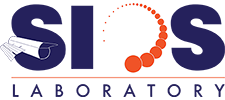Dmitry Savransky
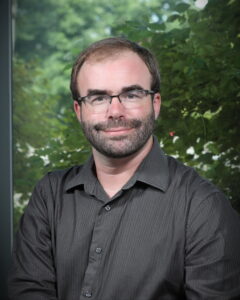 Savransky received his PhD in Mechanical and Aerospace Engineering from Princeton University, where he was a member of the High Contrast Imaging Laboratory. After completing his doctorate in 2011, he became a postdoctoral fellow at the Lawrence Livermore National Laboratory where he assisted in the integration and testing of the Gemini Planet Imager (GPI) and participated in the planning of the GPI Exoplanet Survey (GPIES), for which he serves on the science steering committee. Savransky’s research is comprised of a variety of problems related to the detection and characterization of extrasolar planets. These include investigations of advanced control and estimation for active wavefront control systems; computer vision and machine learning applications for automated optical system alignment and astronomical image post-processing; optimal scheduling for autonomous space observatories and ground-based surveys; and statistical analysis of large astronomical surveys. Full CV.
Savransky received his PhD in Mechanical and Aerospace Engineering from Princeton University, where he was a member of the High Contrast Imaging Laboratory. After completing his doctorate in 2011, he became a postdoctoral fellow at the Lawrence Livermore National Laboratory where he assisted in the integration and testing of the Gemini Planet Imager (GPI) and participated in the planning of the GPI Exoplanet Survey (GPIES), for which he serves on the science steering committee. Savransky’s research is comprised of a variety of problems related to the detection and characterization of extrasolar planets. These include investigations of advanced control and estimation for active wavefront control systems; computer vision and machine learning applications for automated optical system alignment and astronomical image post-processing; optimal scheduling for autonomous space observatories and ground-based surveys; and statistical analysis of large astronomical surveys. Full CV.
Office: 451 Upson Hall
Phone: 646-801-9356
Email: ds264 [at] cornell.edu
If you would like to schedule a meeting, please see my public calendar.
If you would like to know how to pronounce my name, see here.
For my gists, see here.
Graduate Students
Duan Li
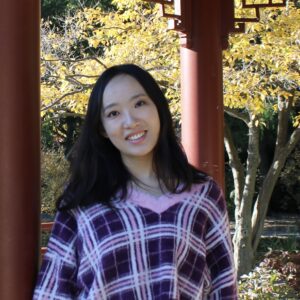 Duan Li received her Bachelor of Science in Mechanical Engineering with a double major in Physics from Johns Hopkins University in May 2018. During her undergraduate studies, she did research in the Cosmology Large Angular Scale Surveyor lab. In the summers, she interned at Shanghai Astronomical Observatory in China and at Max Planck Institute for Astronomy in Heidelberg, Germany. Her senior design project was sponsored by Stanley Black and Decker. Duan joined the lab in Fall 2018 with a research interest in optical instrumentation.
Duan Li received her Bachelor of Science in Mechanical Engineering with a double major in Physics from Johns Hopkins University in May 2018. During her undergraduate studies, she did research in the Cosmology Large Angular Scale Surveyor lab. In the summers, she interned at Shanghai Astronomical Observatory in China and at Max Planck Institute for Astronomy in Heidelberg, Germany. Her senior design project was sponsored by Stanley Black and Decker. Duan joined the lab in Fall 2018 with a research interest in optical instrumentation.
Grace Genszler
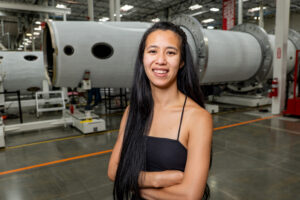 Grace Genszler earned a Bachelor of Arts in Physics from Wheaton College in Massachusetts in May 2018 with a minor in Mathematics. Through a dual degree program with Dartmouth College, she also earned a Bachelor of Engineering with a concentration in Computational Sciences in June 2019. For her honors thesis at Wheaton, she studied the numerical modeling of tethered satellite system dynamics. At Dartmouth, she worked on a design for a Martian greenhouse to support a crewed mission for her capstone. This project won NASA’s 2019 BIG Idea Challenge. After taking a gap year to work in an artisanal bakery, she joined the SIOS lab to do research on trajectory design and mission planning in the fall of 2020 as a Ph.D. student. In 2022 she was awarded a Matthew Isakowitz Fellowship and her host company was Virgin Orbit. She was later awarded an Amelia Earhart Fellowship in 2023.
Grace Genszler earned a Bachelor of Arts in Physics from Wheaton College in Massachusetts in May 2018 with a minor in Mathematics. Through a dual degree program with Dartmouth College, she also earned a Bachelor of Engineering with a concentration in Computational Sciences in June 2019. For her honors thesis at Wheaton, she studied the numerical modeling of tethered satellite system dynamics. At Dartmouth, she worked on a design for a Martian greenhouse to support a crewed mission for her capstone. This project won NASA’s 2019 BIG Idea Challenge. After taking a gap year to work in an artisanal bakery, she joined the SIOS lab to do research on trajectory design and mission planning in the fall of 2020 as a Ph.D. student. In 2022 she was awarded a Matthew Isakowitz Fellowship and her host company was Virgin Orbit. She was later awarded an Amelia Earhart Fellowship in 2023.
Jackson Kulik
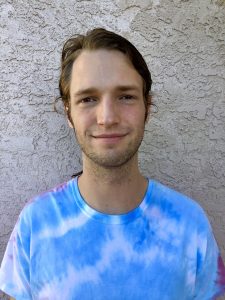 Jackson acquired a Bachelor of Science in Mathematics from Texas Tech University in May 2020. During his undergraduate degree, he studied mathematical biology and numerical analysis. Since 2018, he has interned at The Aerospace Corporation developing tools to simulate formation flight missions in Earth orbit. In the process, he found conditions to reduce the drift of highly elliptical formations under the J2 perturbation. He is as interested in the theory of dynamical systems and numerical analysis as he is in applying these to problems in astrodynamics. In the Fall of 2020, Jackson began his PhD in Applied Mathematics and his membership within SIOS lab where he intends to continue researching relative motion of satellites in two and three body contexts. You’ll often find him curled up with his cat and a dog-eared copy of Vallado.
Jackson acquired a Bachelor of Science in Mathematics from Texas Tech University in May 2020. During his undergraduate degree, he studied mathematical biology and numerical analysis. Since 2018, he has interned at The Aerospace Corporation developing tools to simulate formation flight missions in Earth orbit. In the process, he found conditions to reduce the drift of highly elliptical formations under the J2 perturbation. He is as interested in the theory of dynamical systems and numerical analysis as he is in applying these to problems in astrodynamics. In the Fall of 2020, Jackson began his PhD in Applied Mathematics and his membership within SIOS lab where he intends to continue researching relative motion of satellites in two and three body contexts. You’ll often find him curled up with his cat and a dog-eared copy of Vallado.
Rachel Oliver
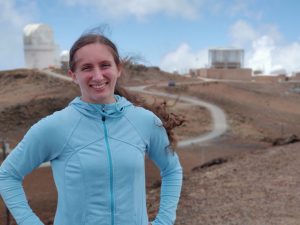 Rachel Oliver received a Bachelor of Science in Mechanical Engineering from the United States Military Academy in May 2015 and subsequently commissioned into the United States Air Force as an astronautical engineer. During her first assignment, she earned a Master of Science in Astronautical Engineering from the Air Force Institute of Technology in March 2017. Her master’s thesis explored simulated light curve fidelity to determine satellite geometry. From 2017 to 2020, Rachel served at the Air Force Research Laboratories Space Vehicles Directorate. She researched remote thermometry of satellites and managed the thermal device portfolio including innovative technologies such as oscillating heat pipes. Rachel became a member of the SIOS lab in the fall of 2020 under a National Science Foundation Fellowship. She intends to research event-based sensors utility in space domain awareness and advance the technology into the infrared spectrum. Rachel transferred to the United States Space Force in February 2021.
Rachel Oliver received a Bachelor of Science in Mechanical Engineering from the United States Military Academy in May 2015 and subsequently commissioned into the United States Air Force as an astronautical engineer. During her first assignment, she earned a Master of Science in Astronautical Engineering from the Air Force Institute of Technology in March 2017. Her master’s thesis explored simulated light curve fidelity to determine satellite geometry. From 2017 to 2020, Rachel served at the Air Force Research Laboratories Space Vehicles Directorate. She researched remote thermometry of satellites and managed the thermal device portfolio including innovative technologies such as oscillating heat pipes. Rachel became a member of the SIOS lab in the fall of 2020 under a National Science Foundation Fellowship. She intends to research event-based sensors utility in space domain awareness and advance the technology into the infrared spectrum. Rachel transferred to the United States Space Force in February 2021.
Colby Merrill
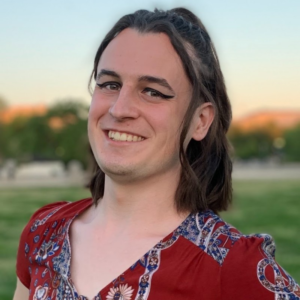 Colby (they/them/theirs) earned a Bachelor of Science in Aerospace Engineering from the University of Maryland in College Park. They are a collaborator on the NASA DART Investigation Team and ESA Hera Science Team. They joined the SIOS lab during fall 2022 and currently research problems at the nexus of astrodynamics and planetary science with a focus on small body dynamics. Some recent highlights have been presenting an original mission design at JHU/APL and the United Nations at the 8th International Planetary Defense Conference. Outside of academics, they read many science fiction novels, play the guitar, and explore the outdoors (rarely all at once).
Colby (they/them/theirs) earned a Bachelor of Science in Aerospace Engineering from the University of Maryland in College Park. They are a collaborator on the NASA DART Investigation Team and ESA Hera Science Team. They joined the SIOS lab during fall 2022 and currently research problems at the nexus of astrodynamics and planetary science with a focus on small body dynamics. Some recent highlights have been presenting an original mission design at JHU/APL and the United Nations at the 8th International Planetary Defense Conference. Outside of academics, they read many science fiction novels, play the guitar, and explore the outdoors (rarely all at once).
Alumni
Christian Delacroix – Postdoc (2015 – 2017)
Joyce Fang – PhD (2014 – 2018; Dissertation: Online Model-Based Estimation for Automated Optical System Alignment and Phase Retrieval Algorithm)
Daniel Garrett – PhD (2015 – 2018; Dissertation: Exoplanet Direct Imaging Detection Metrics and Exoplanet Populations)
Gabriel Soto – PhD (2016 – 2020; Dissertation: Orbital Design Tools and Scheduling Techniques for Optimizing Space Science and Exoplanet-Finding Missions)
Jacob Shapiro – PhD (2016 – 2020; Dissertation: Using Modern Mathematical and Computational Tools for Image Processing)
Wenbo Lou – MS (2018 – 2021; Thesis: Design of High Precision Indoor Localization Algorithm with Kalman Filter and Motion Control Scheme for an Autonomous Mobile Robot)
Dean Keithly – PhD (2016 – 2021; Dissertation: Evaluating and Scheduling Exoplanet Direct Imaging Missions)
Kaitlyn Summey – MS (2019-2022; Thesis: Defining Pupil Knowledge Requirements for Roman Space Telescope Integrated Payload Assembly Testing)
Zvonimir Stojanovski – PhD (2020 – 2023; Dissertation: Nonlinear Filtering with Applications to Astrodynamics)
Corey Spohn – PhD (2018 – 2023; Dissertation: Planning Direct Imaging Observations of Exoplanet with Precursor Data)
MEng Students
Aastha Acharya (2014 – 2015; Final Report)
Allegra Moran (2016 – 2017; co-advised with Daniel Selva; Final Report)
James Lee (2016 – 2017; Final Report)
Willard Andrews and Daniel Wilentz (2016 – 2017; Final Report; Code)
Dane Del Terzo (2017 – 2018; Final Report)
Michael Wang (2017 – 2018; Final Report; Code)
Jeremy Turner (2018 – 2019; Final Report)
Erik Gustafson (2018 – 2019; Final Report)
Zijie Chen, Hyunji Kim, and Alex Zhou (2018 – 2019; Final Report)
Ryan Gao and Seth McCall (2018 – 2019; Final Report)
Kevin Liu (2018 – 2019; Final Report )
Becca Lublin (2019; Final Report)
Xiaotian Liu (2018-2019; Final Report)
Jason Ochs and Christopher Della Santina (2019 – 2020; Final Report)
Hansheng Zhang (2019 – 2020; Final Report)
Yuetong Liu (2019 – 2020; Final Report)
Phil Si (2019 – 2020; Final Report)
Sam Feibel and Nathaniel Kinzly (2020; Final Report)
Sarah Richter (2021; Final Report)
Thomas Taffe and Van Cates(2021; Final Report)
Jayson Figueroa (2021; Final Report)
Brynn Szczesniak (2021)
Evan Wilt (2021 – 2022; Final Report)
Max Yasgur (2022; Final Report)
Undergraduate Researchers
James Haber and Alexandra Voinea (Summer 2015)
Amlan Sinha (2016 – 2017)
Patrick Voorhees (Summer 2016)
Nikhil Ranganathan (2016 – 2017; 2019; Senior Design)
Jeremy Iver (Summer 2017)
Xinwei Liu (2017 – 2018)
Niharika Shukla (2017 – 2018)
Aaron Brown (2017 – 2018)
Anthony Aguilar (2019; Senior Design)
Christopher Della Santina (2017 – 2019)
Jose De La Pena (Summer 2019; LSAMP REU)
Nathaniel Kinzly (2018 – 2020; Senior Design)
Carlos Gascón Álvarez (2019; Visiting UPC Student; Thesis)
Sparsh Gupta (2019)
Bryan Zin (2019)
Xuechun (Bob) Qian (2019 – 2020)
Robert Whitney (2019 – 2020; Senior Design)
Christian Harris (Summer 2020; Astronomy REU)
Shreyasvi Gowda (2020)
Aparajito Saha and Krithik Ranjan (2020)
Evan Wilt (2020 – 2021)
Max Yasgur (2021)
Owen Sorber (2021)
The SIOSlab logo was designed by Claire Koch.
